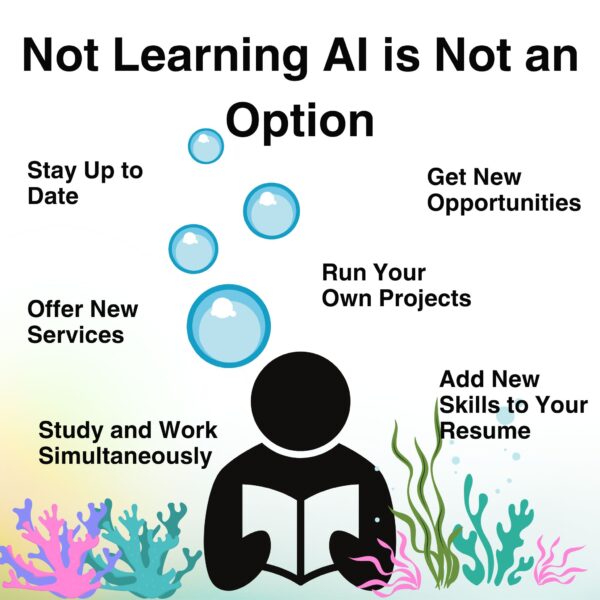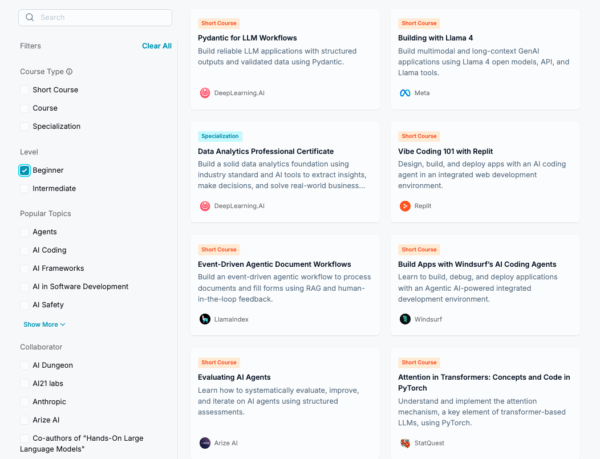“Deep learning” and “AI” have become buzzwords that show up everywhere – from LinkedIn job descriptions to news headlines. But if you’re actually trying to break into the field, all that noise can be overwhelming, especially if you’re not a coder or data scientist. So where do you start? How do you learn real, job-ready AI skills without drowning in technical jargon or spending years in grad school?
That’s exactly the problem I set out to solve when I explored DeepLearning.AI, a learning platform founded by AI pioneer Andrew Ng. In this guide, I’ll give you a practical, honest review of DeepLearning.AI, walk through its learning experience, share tips for beginners, and even show you a simple way to pitch AI upskilling to your boss or team using Aurora Slides.
Maybe you don’t want to become an AI expert? Maybe you are more interested in learning more about how to create an AI Business? This is also possible, but it still requires learning on your end. Feel free to connect with us at Aurora to get a grasp of how you could begin your AI Journey with a full AI System that is easy to use and easy to collaborate with.

Navigating the AI Learning Landscape
Before diving into the specifics of Deep Learning AI, it’s important to understand the landscape…
With so many platforms, courses, and self-taught success stories making the rounds online, it’s easy to feel lost. The good news? There are options for every background and learning style. In the next section, we’ll zoom in on this platform—what it is, who it serves, and why it’s become such a popular starting point.
As AI rapidly reshapes every industry and aspect of daily life, there’s a growing risk of a massive divide: those who understand and can use AI, and those who can’t. This looming gap isn’t just about career opportunities—it’s about who gets to shape the future and who’s left behind.
A lot of roles are evolving to be able to meet the current needs. What do people want now? For example, seasoned business consultants can transition into becoming AI consultants since this will be the jump of the century for most companies and they want to continue to provide their services. They just have to train, educate themselves, practice and finally evolve.
Companies like this one, are playing a vital role in narrowing that divide. By making high-quality AI education accessible to people from all backgrounds, they’re not just helping society adapt—they’re empowering humanity as a whole to thrive in the age of artificial intelligence.
That’s a mission worthy of real respect.
What is Deep Learning .AI and Who Is It For?
You might be wondering: What exactly is this site? And is it really made for someone like you? Whether you’re a manager, a student, or a curious professional, it helps to know who will get the most from this platform – and what makes it different from the rest.
Their Mission
To really understand what sets this platform apart, it helps to look at the philosophy behind it. Every learning platform has a vision—and this one is no exception.
DeepLearning.AI was created to “democratize AI”—making it accessible to everyone, not just engineers and PhDs. The founder, Andrew Ng, is one of the most respected names in artificial intelligence and the co-founder of Coursera, so right away, you know this isn’t just another fly-by-night edtech website. To be more specific their mission is:
“To grow and connect the Global AI Community”
The vibe here is welcoming. Whether you’re a non-technical professional, a student, or someone pivoting careers, their mission is for you to feel you belong.

Is This Platform for You?
Let’s talk honestly. Not every AI course is made for every learner. DeepLearning.AI is a great fit if:
- You want hands-on, practical AI skills (not just theory)
- You’re looking for flexible, online study options
- You care about industry recognition for your learning
Their AI For Everyone course is built for people with zero coding experience, while more advanced tracks like the Deep Learning Specialization are perfect for those ready to get their hands dirty with code.
But, if you want a traditional university degree, in-person classes, or super advanced research, you might want to look elsewhere. Some users mention the content can feel a bit “surface level” for advanced engineers. But then again, not everybody is super advanced!
Real User Perspectives
Don’t just take my word for it. Here are a couple of user comments asking for advice and giving advice:
Should i do this course from deeplearning.ai?
byu/Personal_Ad1437 inlearnmachinelearning
To which another user recommended the following:
Comment
byu/Personal_Ad1437 from discussion
inlearnmachinelearning
This is the Youtube Video Series by Andrew Ng and Stanford, the user was recommending in their comment: Stanford CS229: Machine Learning Course, Lecture 1 – Andrew Ng (Autumn 2018).
Then here are other positive comments of users who got the most out of the courses:
Deeplearning.ai courses are far superior to any other MOOC courses
byu/ChemicalNo282 inlearnmachinelearning
But if you are looking into taking these courses to be able to survive the technical interview process, a user replied the following to the question above:
Comment
byu/ChemicalNo282 from discussion
inlearnmachinelearning
What these real user stories show is that learning (in general) is personal—and there’s no one-size-fits-all answer. Many find DeepLearning.AI’s courses a big step up in quality and clarity, making them worth the investment, especially for building a solid foundation.
Others recommend starting with free resources, then moving to certifications if you want something official on your resume. No matter which path you choose, remember: even the best courses are just the beginning. Real growth comes when you combine strong instruction with your own hands-on projects and keep pushing yourself beyond the classroom.
Courses, Curriculum, and Learning Experience
Now that you have a sense of who DeepLearning.AI is for and what users are saying, let’s get specific. What does the platform actually offer? How are the courses organized, and what’s it like to learn here?
How the Platform is Structured
This site is structured to make AI learning accessible for everyone, especially beginners. Their course catalog is categorized into Specializations, Professional Certificates, and a wide range of Short Courses. You can filter by level (Beginner, Intermediate) and by topic—making it easy to find the right starting point for your journey.
Key Course Types:
- Short Courses: Bite-sized, skill-focused learning modules that usually take just a few hours or days to complete.
- Full Courses: More in-depth, covering foundational topics in AI, deep learning, and related fields.
- Specializations: Curated multi-course series that help you build mastery in a topic area.
- Professional Certificates: Credentials to validate your learning, useful for career changers or those building resumes.

A Look at Popular Beginner Courses
When you visit the DeepLearning.AI beginner course catalog, you’ll find a rich variety of entry-level content taught by respected instructors and AI leaders. Here’s a sample of what you’ll see—each designed to give you practical, job-ready skills:
Learn Python programming with AI assistance. You’ll gain hands-on skills writing, testing, and debugging code, and even create real-world AI applications. No prior coding experience required!
Build reliable LLM (Large Language Model) applications with structured outputs and validated data using Pydantic, a tool that helps ensure your AI apps behave predictably.
Get hands-on with the fundamentals of prompt engineering—learn how to interact with ChatGPT and other LLMs for summarizing, inferring, transforming, and expanding information.
Explore what generative AI can (and can’t) do, see real-world business examples, and understand the impact of AI on society and strategy—no technical background needed.
Experiment with building and deploying apps using an AI coding agent in a web development environment, perfect for true beginners.
Discover how to process documents and fill forms using AI agents and human-in-the-loop feedback—great for those interested in automation and business productivity.
Learn to build, debug, and deploy applications with an agentic, AI-powered IDE—no advanced coding required.
A crash course in how to systematically evaluate, improve, and iterate on AI agents using structured assessments—a must for anyone interested in trustworthy, reliable AI.
An approachable introduction to the attention mechanism, the key element behind modern large language models—complete with hands-on PyTorch code.
Understand the architecture powering today’s most powerful language models, explained accessibly for absolute beginners.
Learn how to design and prompt a team of AI agents to automate business workflows, even if you’re completely new to the topic.
…and many more, covering essentials like data analytics, safe and reliable AI, building long-context AI apps, and collaborative coding with OpenAI Canvas.
What It’s Like to Learn Here
Each course uses a blend of video lessons, interactive coding environments, project-based assignments, and real-world examples. Many short courses are co-developed with top AI companies like OpenAI, Meta, Google Cloud, and more—so you’re learning directly from the people shaping the field.
You can filter the catalog by “Beginner” to avoid getting overwhelmed, and there’s a supportive community for Q&A and networking as you learn.
Pro Tip: Start with a short course in a topic that excites you, then build momentum by stacking more advanced or specialized courses as your confidence grows.
If you’re not sure where to start, use this quick table to decide which DeepLearning.AI beginner course fits your goals, interests, and schedule:
Visual Table: Choosing Your Beginner Course
|
Your Interest/Goal
|
Time Needed per Day
|
Comfort with Coding
|
Recommended Course(s)
|
Format
|
|---|---|---|---|---|
|
Learn AI basics, no coding
|
1-2 hours
|
None
|
|
|
|
Try hands-on coding (Python)
|
2–3 hours
|
None or minimal
|
|
|
|
Explore ChatGPT/LLMs
|
30 min–1 hour
|
Some (optional)
|
|
|
|
Build simple AI apps
|
30 min–1 hour
|
None/Beginner
|
|
|
|
Understand how AI works
|
30 min–1 hour
|
None
|
|
|
|
Automate business tasks
|
1–2 hours
|
None/Beginner
|
|
|
|
Dive deeper into AI models
|
30 min–1 hour
|
Beginner+
|
|
The Hands-On Philosophy
Seeing a list of courses is great, but what’s it like to actually learn on DeepLearning.AI? Here’s where the platform shines—or falls short—depending on your learning style.
What sets this platform apart is its emphasis on practical, project-based learning. You’re not just watching lectures – you’re building, testing, and tweaking real AI models in Jupyter Notebooks. For more information go to AI Python for Beginners. Even if you’ve never coded before, the platform guides you, step by step.
Remembering the “aha!” moment of running your first neural network. Seeing the model improve as you tweak parameters while feeling both empowering and addictive. That’s the kind of lightweight, real-world experience it’s known for.

Instructor & Content Quality
Of course, a great learning experience isn’t just about projects—it’s also about the people teaching you and how up-to-date the curriculum is.
Andrew Ng leads the teaching team, but this organization regularly brings in experts from OpenAI, Google Cloud, and other industry leaders and other course partners. The production quality is high, and the curriculum is updated frequently to reflect the latest trends.
Shortcomings & Critiques
No platform is perfect. Here’s the real scoop:
Pros:
- Beginner-friendly and accessible
- Online, flexible, and self-paced
- Recognized by many employers
- Free courses
Cons:
- Not as advanced as some university programs
- No accredited degree or diploma
- Some users confused about Coursera hosting the long-form content of the courses and DeepLearning.AI the short form.
If you’re already deep into machine learning, you might outgrow the content. But for most folks starting out, it’s a strong foundation.
How to Get the Most Out of DeepLearning.AI
So, you’re interested, and maybe you’re ready to dive in—what’s the best way to maximize your investment? Let’s walk through how to choose the right courses and set yourself up for success.
Strategic Learning Paths
Not sure where to start? Here are some ideas:
- Absolute beginners: AI For Everyone is a friendly entry point.
- Coding newbies: The AI Python for Beginners short course is a great next step.
- Career changers: Go for a professional certificate, then build a small portfolio.
Tips for Success
- Set a weekly study schedule—consistency wins out over cramming.
- Join learner forums—you’ll find support and answers fast.
- Document your projects—even simple ones can help you stand out.
Pro tip: Find ways to showcase your projects online earlier. Even basic demos can attract feedback and job leads.
Going Beyond the Platform
Don’t stop at just taking courses:
- Enter Kaggle competitions or try open datasets.
- Subscribe to The Batch for the latest AI news.
- Network with other learners—even a small peer group can boost your motivation.
- Prioritize your AI Learning journey. Subscribe to Podcasts that talk about AI to shape your thinking and to expand your approach. Check out this Reddit thread with lots of recommendations from AI fanatics.

.
Baby Steps: Pitching AI Learning to Your Team
Maybe you’re not just learning for yourself; maybe you want your whole team to upskill in AI. But how do you convince your boss or colleagues that it’s worth the time and investment? Don’t worry, you don’t have to reinvent the wheel.
Sometimes the hardest part isn’t learning a new skill – it’s getting others to see its value. That’s where Aurora Slides comes in. This is an AI-powered tool that takes your rough notes or ideas and instantly turns them into professional, persuasive presentations – no design skills required.
Here’s how you can use Aurora Slides to pitch an AI learning initiative:
- List your main points—why your team should learn AI, the business benefits, which courses you recommend.
- Drop those points into Aurora Slides and let the AI organize them into a compelling narrative.
- Use simple editing commands like “add a slide showing ROI” or “make this more concise.”
- Share the link with your boss or team, or present live from the app.
It’s a fast, stress-free way to get buy-in; especially if you’re not a PowerPoint pro or public speaker. Also, I recommend before presenting to your team you do as much research as possible and go through guides such as “Mastering AI Adoption Guide: Insights from 2x Agency Founders”, to fully understand the commitment it requires and set the right expectations, collectively.
Watch Aurora Slides in action here:
Is DeepLearning.AI Worth It?
So, is it worth your time, and possibly your money?
Short answer:
Yes, if you’re a beginner or business professional looking for real-world AI skills you can actually use. The platform’s hands-on approach, respected instructors, and practical projects make it stand out. If you’re looking for a formal academic credential or advanced research, you may want to supplement with other resources or read real people’s opinions online, to see how they figured it out in their situation
| Pros | Cons |
| Beginner-friendly, flexible, online | Not as advanced as a degree |
| Industry-recognized certificates | No accredited diploma |
| Real projects & portfolio building | Coursera-only content |
Think of most AI learning platforms as a really good driving school: It might not teach you to engineer a Formula 1 car, but it absolutely can get you safely and confidently on the road. Not everyone needs to be a racecar driver—sometimes, what matters most is just having the keys and the skills to get moving. For many, a hands-on, approachable program is far better than waiting years for the “perfect” university course or feeling stuck in neutral. What you get out of it really depends on what you put in, and where you want to go.
Conclusion
Starting out in AI can feel intimidating, but with platforms like DeepLearning.AI, you don’t need a PhD or years of programming experience to get hands-on skills. Focus on practical learning, build a few real projects, and don’t be afraid to pitch your ideas—especially with tools like Aurora Slides making communication easier than ever.
If you want to start by reading something lighter discussing AI and how to incorporate it to your business you should check out the rest of blogs in our Learning Vault.
Frequently Asked Questions (FAQs)
Is Deep Learning AI good for absolute beginners?
A: Absolutely—start with AI For Everyone if you’re new to the field.
Does a certificate help you get a job?
A: It’s a respected credential and can help you stand out, but it’s not a magic bullet (Reddit discussion).
How does it compare to Fast.ai or university courses?
A: Deep Learning AI is more approachable and practical, while Fast.ai and universities go deeper into theory.
What are the costs and time commitments?
A: Most short courses appear to be free, with specializations taking 1–3 months.
Can you learn on your own, or do you need extra resources?
A: You can start solo, but supplementing with real projects and peer groups is highly recommended.
Can I use Aurora Slides to pitch AI courses to my boss or team?
A: Absolutely. Aurora Slides is perfect for turning your main points—like the benefits of AI upskilling or course recommendations—into a polished, persuasive presentation in minutes. Just add your notes, let the AI organize them, and share the finished deck via link with decision-makers. It’s a fast way to get buy-in, even if you’re not a designer or public speaker.
What makes Aurora Slides different from PowerPoint or Google Slides for AI learning initiatives?
A: Aurora Slides is not just any AI Deck Builder; it’s built for speed and clarity. It uses AI to automatically structure your content, suggest relevant visuals, and keep your messaging focused – especially when you’re pitching complex topics like AI training. Plus, it’s collaborative and cloud-based, so your team can review or edit your pitch from anywhere in real time.
